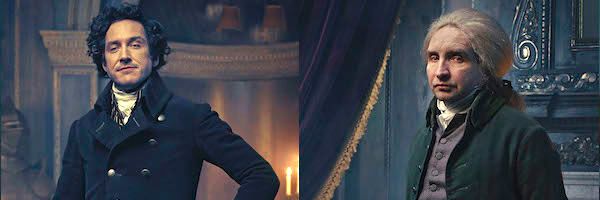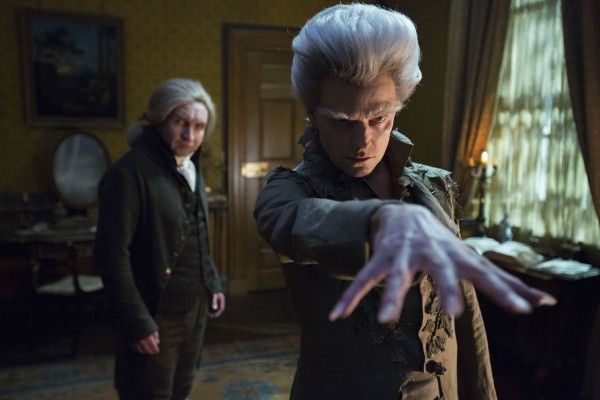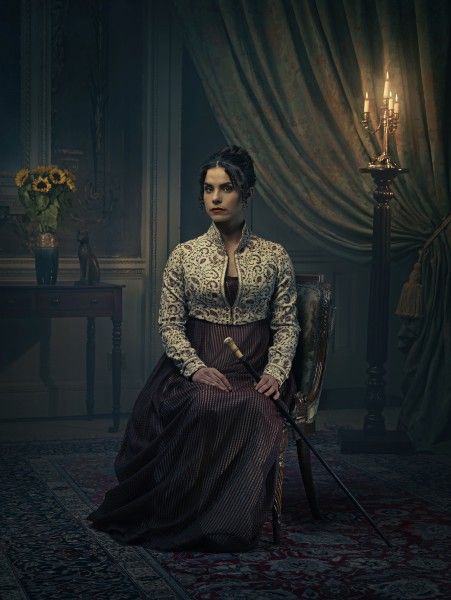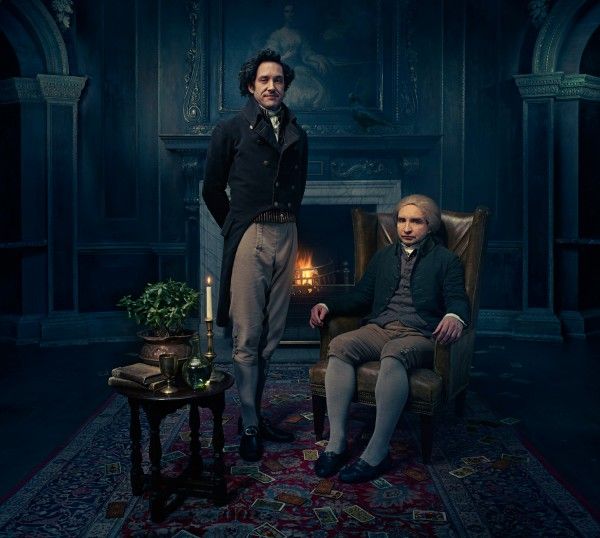In Jonathan Strange & Mr. Norrell, the Napoleonic wars play second fiddle to the "magician wars" of the same era. In the BBC series’ alternate universe (based on Susanna Clarke’s best-selling novel), two dueling magicians begin to discover their powers — and their differences — as part of the fulfillment of a prophesy that has brought magic back to England after 300 years.
The series is a swirling, fast-paced production. All of its seven episodes were written by Peter Harness (Wallander) and directed by Toby Haynes (Doctor Who), which lends a great visual continuity to the series (including its gothic overtones and use of natural light, which grounds its magical elements in reality). The same is not exactly true of the plot, which propels viewers into a number of disparate stories that — as opposed to its visual style —aren’t anchored with as much dramatic weight.
Jonathan Strange & Mr. Norrell, is, however, full of charm. Witticisms fly freely, and the show has a fantastic sense of droll humor, allowing the fantastical to be seen as mundane or just utilitarian. Strange (Bertie Carvel) tells his lady love Arabella (Charlotte Riley) very matter-of-factly that, “I met a man under a hedge who told me I’m a magician.” And so he becomes one.
The series doesn’t give a clear sense of Strange’s dandy-ish personality, though, even three episodes in. Eddie Marsan as Norrell, however, is clearly defined from the very start. Marsan is exceptional as the reclusive magician, and some of the best scenes are of him not wanting (or not understanding how) to interact with society. He is desperate to make those in power believe that magic is back, so that he can use it to help in the war effort. But in order for that to happen, he must make a trade with a nefarious fairy known as The Gentleman (Marc Warren), which is essentially a devil’s pact.
From there, Norrell’s decision splits the story into two parts; one, where magic (now acknowledged) is able to be used in war, and the other, in which the consequences begin to unravel Norrell and his relationship with others in the story. Strange is a part of all of this as well, being sent abroad to use his magic (which appears stronger, or at least, more flamboyant). But like Norrell, his tampering with some of the darker arts leaves him unable to handle the consequences. As both Norrell and Strange are new to their powers, they have a tendency to act without understanding what they did or, more pressingly, how to undo it.
Jonathan Strange & Mr. Norrell could just have focused on Norrell and Strange’s relationship with their magic and with each other (they start as friends, but it’s clear that — as the prophesy foretold — their very different personalities would soon lead to clashes). But, there are a number of subplots that involve The Gentleman, his desire to possess Arabella, and his alliance with a servant, Stephen Black (Ariyon Bakare), as well as a host of other associates and hangers on of Strange, Norrell, and their politician friend Sir Walter Pole (Samuel West). All of these provide many intersecting plots and layers to the story, but none feel as interesting or as essential as when Strange, and especially Norrell, take the lead.
Jonathan Strange & Mr. Norrell is certainly original in its conception of magic and magicians, and the series is never more interesting than when it’s dealing with the consequences of half-baked magic. Yet it falters in what feels like a race to hit plot points, instead of allowing for deeper character development, especially of Strange, who never really comes together as knowable.
By the third episode, the proceedings finally start to feel accessible, even though many, many questions remain regarding the series’ mythology, its aim, and even its tone (though the dry humor is appreciated, it comes in fits and starts). Jonathan Strange & Mr. Norrell never feels fully sure of itself — it runs through its plot and skitters over its characters, as if it's afraid the audience might get too bored before being suitably hooked on the material. With this series, that should never have been a worry, and instead, its anxiety has made it start off muddled and jumpy. Like Strange and Norrell themselves, the series isn’t sure of its powers, throwing everything together at once without being confident in how to manage it. But also like the two magicians, its complexity and its intrigue grows with every passing hour, as it hurtles towards darkness.
Rating: ★★★ Good — Proceed with cautious optimism
Jonathan Strange & Mr. Norrell premieres Saturday, June 13th at 10 p.m. on BBC America.




